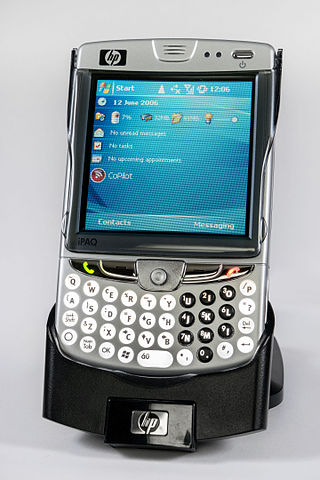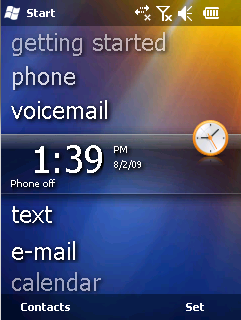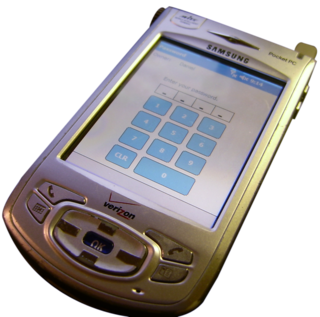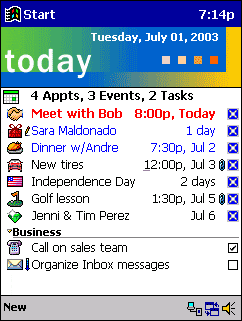
A Pocket PC is a class of personal digital assistant (PDA) that runs the Windows Mobile or Windows Embedded Compact operating system that has some of the abilities of modern desktop PCs. The name was introduced by Microsoft in 2000 as a rebranding of the Palm-size PC category. Some of these devices also had integrated phone and data capabilities, which were called Pocket PC Phone Edition or simply "Smartphone".

The iPAQ is a discontinued Pocket PC and personal digital assistant which was first unveiled by Compaq in April 2000.

Pocket Viewer was a model range of personal digital assistants (PDAs) developed by Casio around the turn of the 21st Century.

Windows Mobile was a family of mobile operating systems developed by Microsoft for smartphones and personal digital assistants.
Remote administration refers to any method of controlling a computer from a remote location. Software that allows remote administration is becoming increasingly common and is often used when it is difficult or impractical to be physically near a system in order to use it. A remote location may refer to a computer in the next room or one on the other side of the world. It may also refer to both legal and illegal remote administration.
The Microsoft .NET Compact Framework is a version of the .NET Framework that is designed to run on resource constrained mobile/embedded devices such as personal digital assistants (PDAs), mobile phones, factory controllers, set-top boxes, etc. The .NET Compact Framework uses some of the same class libraries as the full .NET Framework and also a few libraries designed specifically for mobile devices such as .NET Compact Framework controls. However, the libraries are not exact copies of the .NET Framework; they are scaled down to use less space.

Windows Mobile 2003, originally codenamed "Ozone", was a member of the Windows Mobile family of mobile operating systems, released on June 23, 2003. It was the first Microsoft mobile OS to be called "Windows Mobile" and was based on Windows CE 4.20.

Windows Live Mesh is a discontinued free-to-use Internet-based file synchronization application by Microsoft designed to allow files and folders between two or more computers to be in sync with each other on Windows and Mac OS X computers or the Web via SkyDrive. Windows Live Mesh also enabled remote desktop access via the Internet.

The SPH-i700 is a Windows Mobile-powered smartphone manufactured by Samsung of Korea. It is a powerful and expandable second generation Pocket PC phone compared to others in its class. It includes a transflective display, a VGA camera, 300 MHz Processor and supports SDIO, making it a competent PDA. It includes a complete bundle of accessories, including: a case, stereo headset-mic, cradle and both a regular and extended battery. The wireless radio was reported to get strong signals, and offered good voice quality and fast data speeds on Verizon's Express Network. The unit runs the Pocket PC 2002 Phone Edition OS, and in July 2004, Verizon started shipping units running Windows Mobile 2003 Phone Edition. Windows Mobile 2003 Phone Edition offers the same improvements found in regular Pocket PCs running this OS: improved Pocket Internet Explorer, always on networking, an improved networking connection manager and overall speed improvements. Samsung makes a similar model called the SGH-i700 which is identical to the SPH-i700 except for it works on the GSM/GPRS network.

Quick Assist is a Microsoft Windows feature that allows a user to view or control a remote Windows computer over a network or the Internet to resolve issues without directly touching the unit. It is based on the Remote Desktop Protocol (RDP). It is complemented by Get Help, a feature introduced in Windows 10 that enables the user to contact Microsoft directly but does not allow for remote desktoping or screen sharing.

Windows Live for TV is a Windows Media Center application that was part of Microsoft's Windows Live services. It provides users to access Windows Live Spaces, Messenger, and Call on their large-screen monitors or TVs using their PC.

Windows Mobile Device Center is a synchronization software program developed by Microsoft, and the successor to ActiveSync. It is designed to synchronize various content including music, video, contacts, calendar events, web browser favorites, and other files between Windows Mobile devices and the Microsoft Windows operating system.

The Palm Foleo was a planned subnotebook computer that was announced by mobile device manufacturer Palm Inc. on May 30, 2007, and canceled three months later. It intended to serve as a companion for smartphones including Palm's own Treo line. The device ran on the Linux operating system and featured 256 MB of flash memory and an immediate boot-up feature.
Rapi or RAPI may refer to:

Pocket, previously known as Read It Later, is a social bookmarking service for storing, sharing, and discovering web bookmarks. Released in 2007, the service was originally only for desktop and laptop computers, and is now available for macOS, Windows, iOS, Android, Windows Phone, BlackBerry, Kobo eReaders, and web browsers.
Microsoft mobile services are a set of proprietary mobile services created specifically for mobile devices, they are typically offered through mobile applications and mobile browser for Windows Phone, | platforms, BREW, and Java. Microsoft's mobile services are typically connected with a Microsoft account and often come preinstalled on Microsoft's own mobile operating systems while they are offered via various means for other platforms. Microsoft started to develop for mobile computing platforms with the launch of Windows CE in 1996 and later added Microsoft's Pocket Office suite to their Handheld PC line of PDAs in April 2000. From December 2014 to June 2015, Microsoft made a number of corporate acquisitions, buying several of the top applications listed in Google Play and the App Store including Acompli, Sunrise Calendar, Datazen, Wunderlist, Echo Notification Lockscreen, and MileIQ.

Pocket PC 2000 was the first member of the Windows Mobile family of mobile operating systems that was released on April 19, 2000, and was based on Windows CE 3.0. It is the successor to the operating system aboard Palm-size PCs. Backwards compatibility was retained with such Palm-size PC applications.
RAPIS-1 is a satellite launched on 18 January 2019 which for over a year was used to test seven technology demonstration projects. RAPIS-1 was developed and operated by Axelspace Corporation, under the coordination of the Japanese space agency JAXA.











